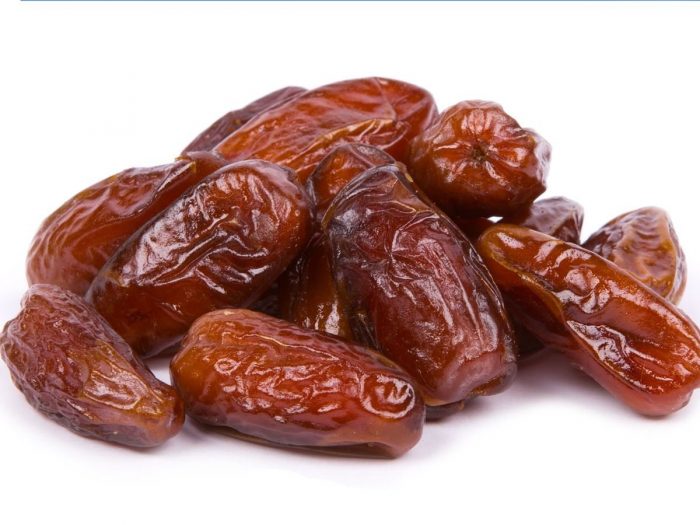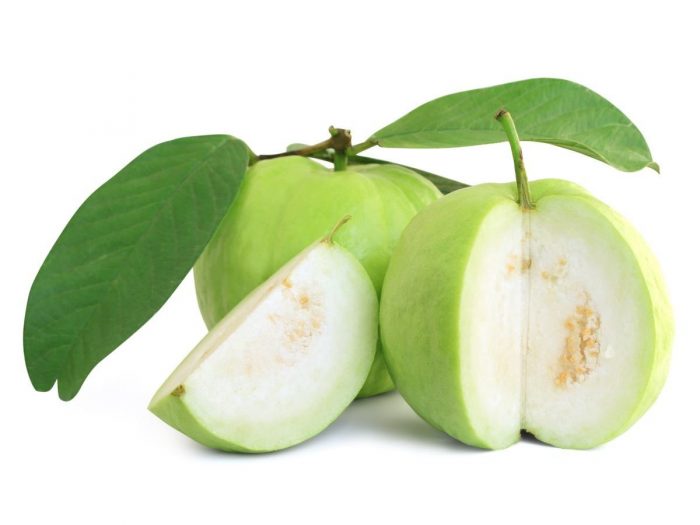The benefits of dates include relief from constipation, intestinal disorders, heart problems, anemia, sexual dysfunction, diarrhea, abdominal cancer, and many other conditions. Dates are good for gaining weight also. Dates are rich in several vitamins, minerals and fiber too. These delicious fruits contain oil, calcium, sulfur, iron, potassium, phosphorous, manganese, copper and magnesium which are all beneficial for health. Some health specialists have said that eating one day per day is necessary for a balanced and healthy diet.
The massive health benefits of dates have made them one of the best ingredients for muscle development. People consume dates in several ways, such as mixing the paste of the dates with milk, yogurt or with bread or butter to make them even more delicious. The paste is beneficial for both adults and children, especially during a time of recovery from injury or illness.
According to a modern medical survey, it is now accepted that dates are useful in preventing abdominal cancer. Many Muslims break their fast by eating dates and water according to their cultural traditions. Breaking fast by eating dates helps avoid overeating of food after the fast is finished. When the body begins to absorb the high nutritional value of the dates, feelings of hunger are pacified. Also, the nervous system can get a lot of help from consuming dates, since they have such significant amounts of potassium.
Dates are one of the very best sweet and versatile foods that can regulate the digestive process. It can significantly boost energy levels in people within half an hour of consuming it. The American Cancer Society recommends an intake of 20-35 grams of dietary fiber per day, which can be supplied through dates. It is also said that taking one date per a day will help you to maintain your eye health all your life. They are commonly known to be quite effective in guarding against the problem of night blindness.
 Nutritional Value of Dates
Nutritional Value of Dates
Dates are a good source of various vitamins and minerals. Its a good source of energy, sugar and fiber. Essential minerals such as calcium, iron, phosphorus, sodium, potassium, magnesium and zinc are found in dates. It also contains vitamins such as thiamin, riboflavin, niacin, folate, vitamin A and vitamin K.
Health Benefits of Dates
Constipation: Dates are often categorized as a laxative food. This is why dates are so frequently eaten by people suffering from constipation. In order to achieve the desired laxative effect of dates, you should soak them in water over night. Then, eat the soaked dates in the morning like syrup to get the most optimal results. Dates have high levels of soluble fiber, which is essential in promoting healthy bowel movements and the comfortable passage of food through the intestinal tract, which can relieve symptoms of constipation.
Bone Health and Strength: The significant amounts of minerals found in dates make it a super food for strengthening bones and fighting off painful and debilitating diseases like osteoporosis. Dates contain selenium, manganese, copper, and magnesium, all of which are integral to healthy bone development and strength, particularly as people begin to age and their bones gradually weaken. So, eat your dates and give a boost to your bones!
Intestinal Disorders: The nicotine content in dates is thought to be beneficial for curing many kinds of intestinal disorders. Continuous intake of dates helps to inhibit growth of the pathological organisms and thus, they help stimulate the growth of friendly bacteria in the intestines. In terms of digestive issues, dates contain those insoluble and soluble fibers, as well as many beneficial amino acids which can stimulate the digestion of food and make it more efficient, meaning that more nutrients will be absorbed by the digestive tract and enter your body for proper usage.
Anemia: Dates have a high mineral content, which is beneficial for many different health conditions, but their impressive levels of iron make them a perfect dietary supplement for people suffering from anemia. The high level of iron balances out the inherent lack of iron in anemic patients, increasing energy and strength, while decreasing feelings of fatigue and sluggishness.
Allergies: One of the most interesting facets of dates is the presence of organic sulfur in them. This is not a very common element to find in foods, but it does have a worthwhile amount of health benefits, including the reduction of allergic reactions and seasonal allergies. According to a study done in 2002, organic sulfur compounds can have a positive impact on the amount of suffering people experience from SAR (Seasonal Allergic Rhinitis), which affects approximately 23 million people in the United States alone. Dates are a great way to somewhat stem the effects of those seasonal allergies through its contributions of sulfur to the diet.
Weight Gain: Dates should be included as a part of a healthy diet. They consist of sugar, proteins and many essential vitamins. If dates are consumed with cucumber paste, you can also keep your weight at a normal, balanced level, rather than over-slimming. One kilogram of dates contains almost 3,000 calories, and the calories in dates are sufficient to meet the daily requirements for a human body. Of course, you should not eat just dates throughout the day. If you are thin and slim and want to increase your weight, or if you are trying to build your muscles to impress some girl, or you have become weak due to a serious medical problem – you need to eat dates!
Energy Booster: Dates are high in natural sugars like glucose, fructose, and sucrose. Therefore, they are the perfect snack for an immediate burst of energy. Many people around the world use dates for a quick afternoon snack when they are feeling lethargic or sluggish.
Nervous System Health: The vitamins present in dates make it an ideal boost to nervous system health and functionality. Potassium is one of the prime ingredients in promoting a healthy and responsive nervous system, and it also improves the speed and alertness of brain activity. Therefore, dates are a wonderful food source for people as they begin to age and their nervous system becomes sluggish or unsupported, as well as for people who want to keep their mind sharp.
Healthy Heart: Dates are quite helpful in keeping your heart healthy. When they are soaked for the night, crushed in the morning and then consumed, they have been shown to have a positive effect on weak hearts. Dates are also a rich source of potassium, which studies have shown to reduce the risk of stroke and other heart related diseases. Furthermore, they are suggested as a healthy and delicious way to reduce the levels of LDL cholesterol in the body, which is a major contributing factor heart attacks, heart disease, and stroke. Therefore, when taken twice a week, dates can seriously improve the overall health of the heart.
Sexual Weakness: Studies have shown that dates are even beneficial for increasing sexual stamina. Soak a handful of dates in fresh goat’s milk over night, then grind them in the same milk with a mixture of cardamom powder and honey. This mixture becomes a very useful tonic for increasing sexual endurance and reducing sterility caused by various sexual disorders. The science behind this phenomenon is largely due to traditional usage which stimulated formal research. In 2006, Bahmanpour studied the effects of date palms and their oil on sexual functioning and found that the high levels of estradiol and flavonoid components of dates are what increase sperm count and motility, as well as promoting increased testes size and weight. So, if you are looking for a masculine boost, eat some dates, because they are a great natural aphrodisiac!
 Night Blindness: The benefits of dates are extensive, and are commonly employed to fight off various conditions affecting the ear, nose, and throat. When the leaves of the date palm are ground into a paste and rubbed on and around the eyes, or when dates are ingested orally, it has been shown to reduce the frequency of night blindness, and this solution is commonly used in rural areas where dates grow as an alternative medicine.
Night Blindness: The benefits of dates are extensive, and are commonly employed to fight off various conditions affecting the ear, nose, and throat. When the leaves of the date palm are ground into a paste and rubbed on and around the eyes, or when dates are ingested orally, it has been shown to reduce the frequency of night blindness, and this solution is commonly used in rural areas where dates grow as an alternative medicine.
Intoxication: Dates are commonly used as a remedy for alcoholic intoxication. Dates provide quick relief and have a sobering effect in case you feel as though have consumed an uncomfortable amount of alcohol. They can also be used the following morning to prevent severe hangovers. Again, they should be rubbed and soaked overnight for the best results.
Diarrhea: Ripe dates contain potassium, which is known as an effective way of controlling diarrhea. They are also easy to digest, which further helps alleviate the unpredictable nature of chronic diarrhea. The soluble fiber in dates can also help relieve diarrhea, by providing bulk to the bowel movements and promoting normal, healthy functioning of the excretory system.
Abdominal Cancer: Research has pointed towards dates being a legitimate way to reduce the risk and impact of abdominal cancer. They work as a useful tonic for all age groups, and in some cases, they work better than traditional medicines, and are natural, so they don’t have any negative side effects on the human body. They can be quickly and easily digested for a quick boost of energy.
Although dates carry tremendous nutritional values, great care should be taken in their selection because their surface is very sticky, which often attracts various impurities. Therefore, you should only consume dates that are processed and packaged properly. Also, make sure to wash them thoroughly before you eat them, as this will help remove the impurities present on the surface.
 Diabetes: In a related benefit to blood pressure mentioned above, an intake of guava can also help those patients who suffer from
Diabetes: In a related benefit to blood pressure mentioned above, an intake of guava can also help those patients who suffer from 

